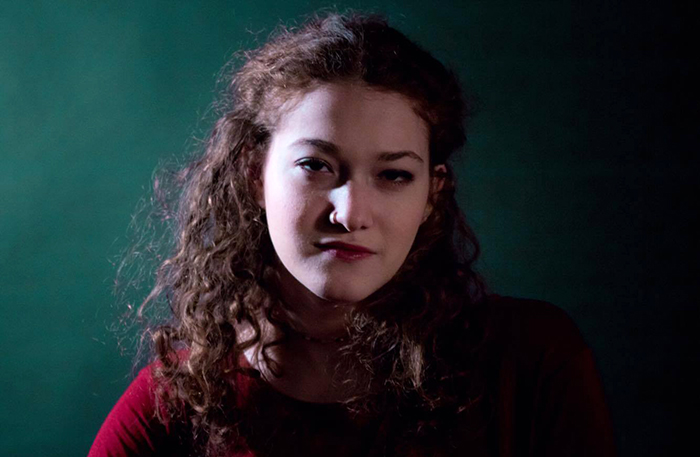Sparking Social Change Through Art

Sarah Zimmer ’17
For Sarah Zimmer ’17, Dickinson is a place where dreams come true. She discusses the life-changing experience of organizing a rally and march in support of an anti-discrimination ordinance, the value of discovering other people’s stories, her lunch with a Pulitzer Prize-winning playwright, the ways art can transform lives and a powerful senior project that helps deepen audience’s understanding of mental illness.
Majors:
History and theatre arts.
Clubs and organizations:
Mermaid Players Executive Board, Music Society (intradepartmental outreach chair), History Majors Committee, history and music department assistant, College Choir, Collegium and Senior Class Gift Committee.
Honors/scholarships/awards:
Walkley Award, Alumni Council Scholarship and Co-Curricular Scholarship for Musical Studies.
Proudest accomplishment:
Last winter, along with Cailin Smith ’18, I organized a rally and then march [in support of] Carlisle’s anti-discrimination ordinance. The vote was passed. I worked very hard in a very short amount of time and the turnout was fantastic. Seeing Dickinsonians gather to fight against injustice was life-changing.
On choosing a major:
When I was a freshman, I was at a party, and a junior looked around the room and said, “This is great and all, but you need to find what gets you up every morning.” For me, it’s stories—hearing people’s stories, learning from them and analyzing them. History and theatre are two majors centered around stories. I’ve gained the wisdom of many lives this way.
Favorite professor:
Professor [of History] Karl Qualls. His Interwar Europe class inspired me to declare the major, and he has come to every show I’ve performed in and has never once turned me away from his office, whether I’ve come for academic or life advice.
If I could have dinner with anyone, living or dead, it would be …
… Playwright/Screenwriter John Patrick Shanley. I actually did get to have lunch with him when he came to campus for the Stellfox Prize in the fall, but I dream of more time with the man. Check out his Twitter, if you can.
My nickname for Dickinson:
I call Dickinson “dreamland.” It sounds silly, but I call it that because anything can happen here. Not once have I been told, “No, that isn’t feasible. You can’t do this.” I’ve grown as a person because I’ve been given the opportunities to do so.
Biggest influences:
My father and my grandfather. They taught me how to treat people, how to work hard and how to have fun. They are the reason I can provide others with strength and support, because they have given it to me, unconditionally. I hope to one day have their patience and resilience.
About my senior project:
I’m performing in a show called Next to Normal. The show explores the difficulties of living with, treating and loving someone with a mental illness, and I play a mother with severe bipolar disorder. For my senior theatre project, and to play this role faithfully, I did extensive research, talking with psychologists, pharmacists and people who have the disorder. I additionally did community-engagement projects, such as creating a video series that gives Dickinson students a platform to talk about their experiences with mental illness, and organizing a forum on campus resources. [The experience has been] a dream come true. I got to connect my work as a performer, researcher and activist. That’s pretty incredible.
What I learned:
Mental illness is extremely individual, in terms of living with it and coping with it, but all around, it’s brutal in every aspect. People who make it through are incredibly strong.
Why it’s important to me:
I’ve struggled with depression and anxiety for years, and I’ve known since coming into the theatre department at Dickinson that this show was something I wanted to do. We do a good job talking about a lot of things on campus, but I don’t think mental illness is one of them, and it’s well past time to reduce the stigma. The show portrays it honestly and really captures all the complexities of living with a mental illness. Working with subject matter like this is exhausting but has also proven very helpful to my own understanding [of mental health struggles]. Theatre has the capacity to spark immense change and to help some people, and I’m beyond excited to demonstrate that.
Most important thing I’ve learned so far:
Finding a balance between work and play is crucial. Some nights, or even some weeks, you have to miss social gatherings to do your academic work. I think this is obvious to most students. However, some nights you have to skimp out on readings or procrastinate on that paper one more day to take care of yourself. These memories are important. These moments are important. These people are important. Savor them. Four years goes way too fast.
Post-Dickinson plans:
I’m hoping to start a career in community engagement through theatre. I’m a firm believer that the arts provide fertile ground for social change, and we should take advantage of that. Thirty years down the road, I hope to be an artistic director of a major theatre. I want to program productions that resonate with our current cultural moment and provide catharsis for those who need it.
Learn more
- Department of History
- Department of Theatre & Dance
- "Reframing Normalcy"
- “A March to Victory”
- More Student Snapshots
- Latest News
Published February 23, 2017